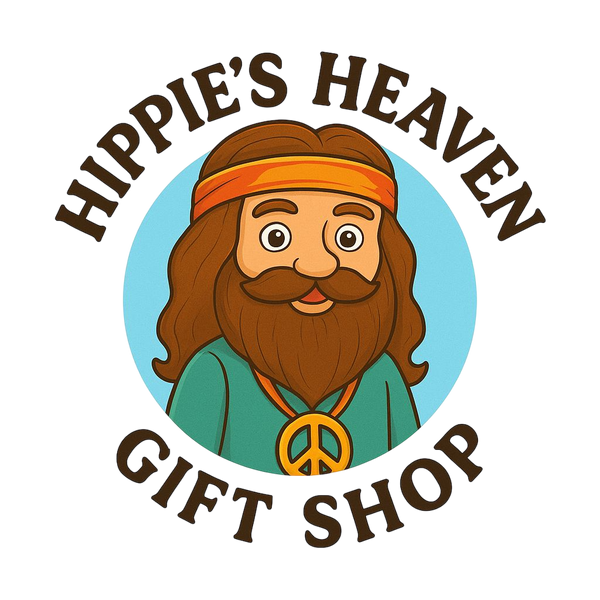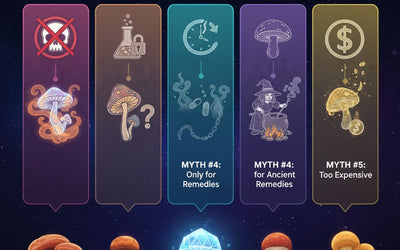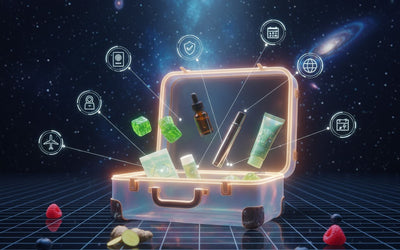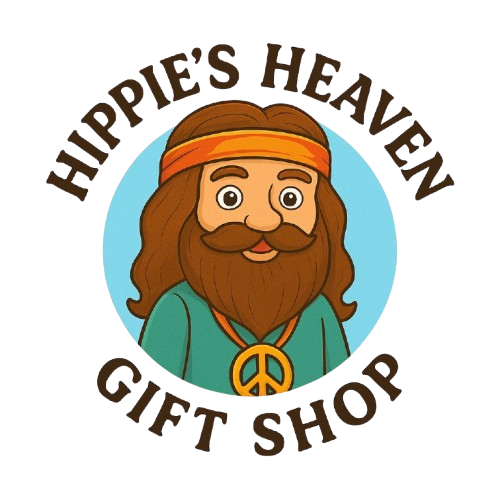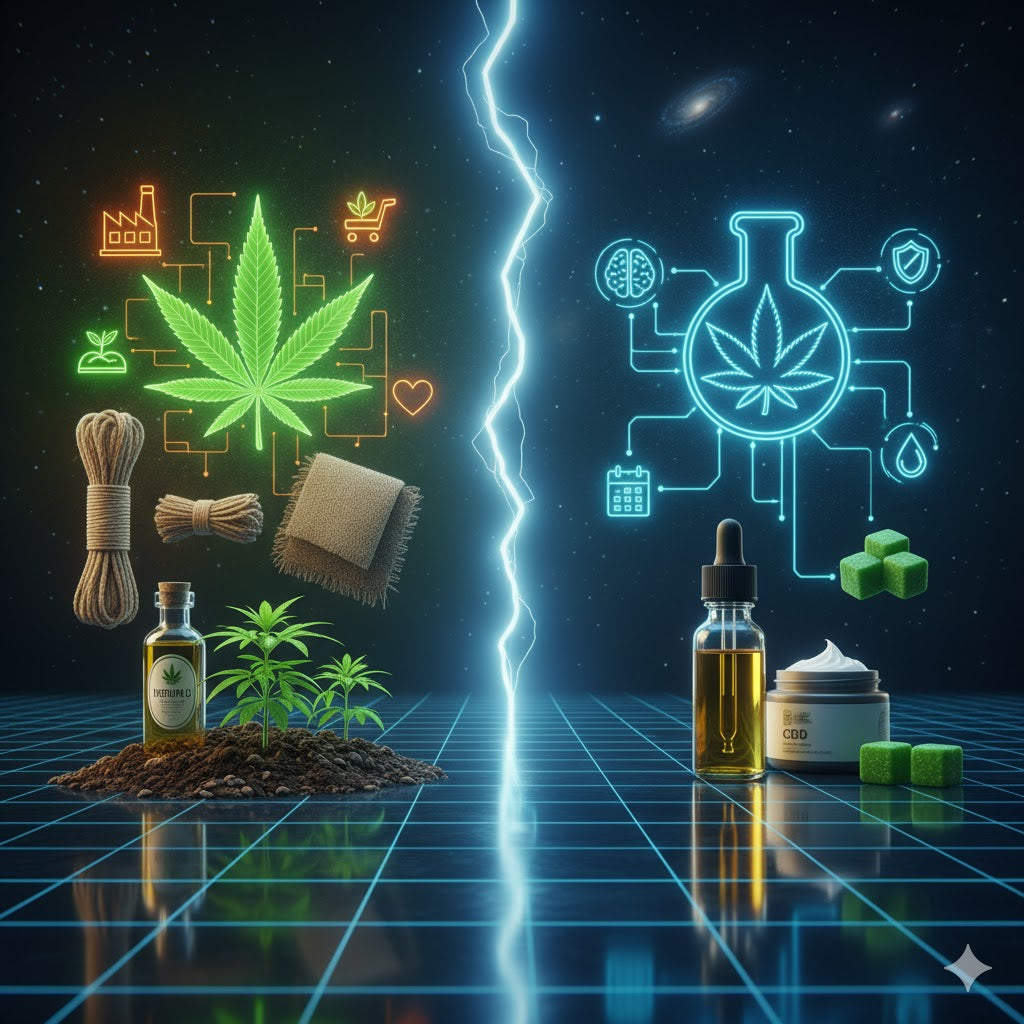
Hemp vs. CBD: Why the Difference Actually Matters
Share
If you’ve ever browsed a wellness shop or scrolled through hemp brands online, you’ve probably seen the terms “hemp” and “CBD” used like they mean the same thing.
They’re close—but not identical.
Understanding this difference isn’t just for cannabis experts. It affects how your products work, how they’re regulated, and what you should expect from what you buy.
Let’s clear the air once and for all: what’s the real difference between hemp and CBD—and why does it actually matter?
Hemp: The Source of It All
Hemp is a plant, part of the Cannabis sativa family. It’s a versatile crop used for everything from wellness oils to textiles, paper, biofuel, and even food.
What makes hemp special—and federally legal in the U.S.—is its low THC content. Under the 2018 Farm Bill, hemp must contain less than 0.3% THC on a dry weight basis.
That means hemp won’t get you high, but it still contains a spectrum of beneficial cannabinoids, terpenes, and nutrients that support the body’s balance.
CBD: The Star Compound
CBD, short for cannabidiol, is one of over 100 cannabinoids naturally found in hemp and cannabis plants.
It’s not a plant—it’s a compound extracted from hemp. You can think of hemp as the orange, and CBD as the juice inside.
CBD interacts with your endocannabinoid system (ECS)—a network of receptors that helps regulate sleep, mood, pain, inflammation, and stress. Unlike THC, CBD doesn’t cause intoxication. Instead, it promotes balance, calm, and overall wellness.
Hemp Oil vs. CBD Oil — The Confusion Explained
This is where things often get mixed up on store shelves.
There are two main types of oils that come from hemp:
-
Hemp Seed Oil
-
Made by cold-pressing hemp seeds.
-
Contains zero CBD or THC.
-
Rich in omega fatty acids, vitamins, and antioxidants.
-
Commonly used in skincare and cooking.
-
-
CBD Oil (Hemp Extract Oil)
-
Made from the flowers, leaves, and stalks of hemp, where cannabinoids live.
-
Contains CBD and other cannabinoids like CBG, CBC, or trace THCA.
-
Used for relaxation, focus, and relief.
-
Both come from the same plant, but they serve completely different purposes.
If you’re looking for wellness benefits like reduced stress or better sleep, you need CBD oil, not hemp seed oil.
Why the Difference Matters for Wellness
Let’s say you buy a bottle labeled “hemp oil” because you heard it helps with anxiety. You try it for a week and feel nothing.
That’s not because CBD doesn’t work—it’s because you didn’t actually buy CBD.
The product was likely hemp seed oil, which, while nutritious, doesn’t interact with the endocannabinoid system.
Knowing the difference ensures you:
-
Get the right product for your goals.
-
Understand the dosage you’re taking.
-
Avoid wasting money on mislabeled or confusing items.
Full-Spectrum, Broad-Spectrum, or Isolate — More Than Buzzwords
When it comes to CBD products, you’ll see terms like full-spectrum, broad-spectrum, or isolate on the label. Here’s what they really mean:
🌿 Full-Spectrum CBD:
Contains all cannabinoids and terpenes from the hemp plant, including trace THC (<0.3%). Produces the “entourage effect”, where all compounds work together for stronger benefits.
🌾 Broad-Spectrum CBD:
Similar to full-spectrum but with the THC removed. Perfect for those who want the full benefits of hemp without any THC risk.
💎 CBD Isolate:
Pure CBD with all other cannabinoids and terpenes stripped away. Great for precise dosing or those with sensitivity to other compounds.
Each type has its place depending on your lifestyle and comfort with THC.
The Legal Side: Hemp vs. Marijuana
Hemp and marijuana are both cannabis, but their THC content is the legal line that separates them.
-
Hemp = ≤0.3% THC (Legal federally)
-
Marijuana = >0.3% THC (Controlled substance under federal law)
This means CBD products derived from hemp are legal in most U.S. states, while CBD from marijuana may still be restricted depending on local laws.
Always check where your product is sourced from—and make sure it comes with third-party lab results proving compliance.
How to Tell If a Product Is Legit
With so many “hemp” and “CBD” labels floating around, here’s how to make sure you’re getting what you pay for:
✅ Check the ingredients: Look for “CBD” or “hemp extract,” not just “hemp seed oil.”
✅ Ask for COAs: Lab results should confirm cannabinoid content and THC levels.
✅ Know the dosage: Quality CBD brands list milligrams per serving.
✅ Avoid vague marketing: “Hemp oil for wellness” isn’t enough information.
Transparency is the new luxury in hemp wellness.
Final Thoughts
The hemp industry is evolving fast—and education is your best tool.
Hemp and CBD might share roots, but they serve different roles in the wellness ecosystem. Hemp is the foundation, while CBD is the active ingredient that delivers real, measurable effects.
So the next time someone says, “I tried hemp, it didn’t work,” you’ll know why.
It’s not just about the plant—it’s about understanding what’s inside your product.
